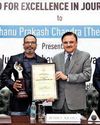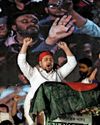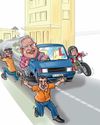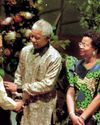
In his new book, diplomat-turned-historian T.C.A. Raghavan offers a different view of India's most well-known story-the independence struggle. Till now, notwithstanding the well-known bromances between big leaders, the story of the independence movement has never really been told through the prism of personal friendships. Raghavan does just that in Circles of Freedom: Friendship, Love and Loyalty in the Indian National Struggle.
At its heart, the book is about three men and their friendship with poet Sarojini Naidu-lawyer-politicians Asaf Ali, who became the first Indian ambassador to the United States, and Syed Mahmud, who became deputy minister of external affairs, and journalist Syud Hossain, India's first ambassador to Egypt.
"I don't think anyone was ever was blind to the fact that they were not in the foreground [of the freedom struggle]," says Raghavan. "The question I was asking was not about the big political issue or even about the big Hindu-Muslim issue, because those, of course, are there. The question I ask [is about] people and their personal feelings-love, friendship, loyalty. How was that part of the big political struggle?"
Naidu's feisty, fearless and sometimes even flirty relationship with the men form the circle through which Raghavan views the politics of the time. "Radiant and restless, full of sparkling life and laughter", is how Asaf describes Naidu, a mother of four in her thirties. "They (the men)," says Raghavan, "came from cloistered backgrounds, and nothing in their social experience prepared them to meet someone like her."
Naidu soon became their guide and expanded their world. A fierce proponent of Hindu-Muslim unity, she did more than just preach. "I didn't know the extent to which she invested in her Muslim friends," says Raghavan.
This story is from the April 14, 2024 edition of THE WEEK India.
Start your 7-day Magzter GOLD free trial to access thousands of curated premium stories, and 9,000+ magazines and newspapers.
Already a subscriber ? Sign In
This story is from the April 14, 2024 edition of THE WEEK India.
Start your 7-day Magzter GOLD free trial to access thousands of curated premium stories, and 9,000+ magazines and newspapers.
Already a subscriber? Sign In

The war and the winner
THE WEEK’s Bhanu Prakash Chandra bags the prestigious IPI award for his coverage of the Russia-Ukraine war from the frontlines

India Fashion Week is 25
India Fashion Week is now 25 years old. Never mind all the brand names that came before the term 'India Fashion Week'—some have stayed, many have gone. The important thing is that season after season, in two cities at times, with two or three warring sponsors at times, India Fashion Week held its head above the water and sustained.

Kalki, out of the box
I love the fact that Kalki Koechlin, one of our most versatile actors, does not fit into a box.

Vote's the plan
Student protesters have launched a political party, but can the country move beyond its binary political landscape?

Learners shall inherit the roads
I used to love driving in Delhi! The broad smooth roads, with well-laid out footpaths and cycle tracks, made every drive a glorious experience. As the years passed, I graduated from a Lambretta scooter to a Fiat 1100 to a Maruti 800, then quickly to a Zen and several years later to a Swift Dzire, till I reached my current Maruti Ciaz. The roads of Delhi, meanwhile, deteriorated from being the smooth cheeks of you-know-who of Bollywood to the smallpox-pitted face of that character actor of the same celluloid vintage.

AN AFFAIR TO REMEMBER
The public dressing-down of Zelensky at the White House is a timely reminder that India should zealously protect its strategic autonomy in external affairs

Every structure we build is a reflection of our commitment to innovation and quality
My journey in real estate has been nothing short of transformative. I hold an MBA in Finance, which has given me a strategic understanding of business, investments, and market dynamics.

India's Coal Miner CCL Nurtures Green Growth
Central Coalfields Limited (CCL), is in the forefront of India's coal mining sector driving technological innovation, and community development for contributing to India's long-term energy security while aiming for global sustainability goals. By fostering a resilient coal mining industry, the company's strategic roadmap focuses on enhancing resource efficiency, reduce its carbon footprint, and transform the mining sector for empowering India's clean energy practices and initiatives. A responsible miner, the Category-I Mini-Ratna PSU, touched a record high of 86 million tonnes of coal production during 2023-24.

Breaking Barriers
The Unstoppable Rise of Indian Women

EMPOWERING GENERATIONS: The Remarkable Journey of Dr. Reshma Kaur
Every institution, whether in education or business, thrives under the guidance of visionary leadership.